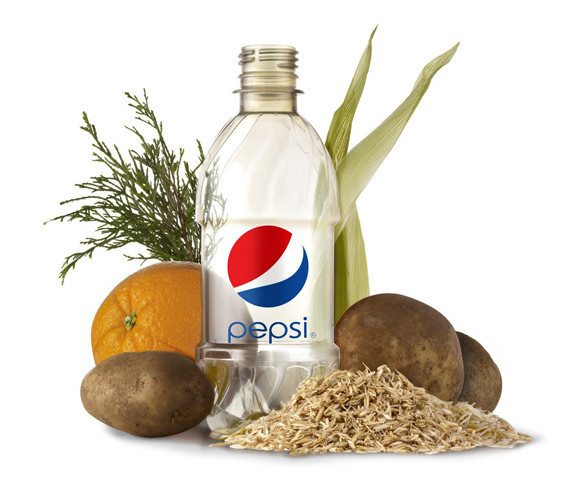 World’s first entirely plant-based PET bottle
World’s first entirely plant-based PET bottle
PepsiCo Inc. unveiled a PET (polyethylene terephthalate) bottle made of 100-percent plant material, upstaging Coca-Cola and its 30-percent recycled material bottle. The Pepsi bottle is made from switch grass, pine bark, corn husks and other materials. Pepsi plans to eventually incorporate orange peels, oat hulls, potato scraps and other leftovers from its food business into construction of the bottle. The new bottle looks, feels and protects in the same way, says a senior VP at Pepsi, and won’t cost consumers more to buy. Though the plant-based PET bottle is not biodegradable, reports HuffPo, it is fully recylable. (Huffington Post)
Carbon-Footprint Calculator Helps the Lazy Fight Climate Change
According to two climate-change communications research centers, one at Yale, the other at George Mason University, Americans are very adept at making excuses for poor everyday behaviors that affect global climate change. Fewer and fewer Americans are doing things like keeping their thermostat low during the winter (45 percent, down from 62 percent in 2008). The pessimistic views that most Americans have about their contribution to climate change are impacting their daily choices and therefore impacting our environment. This footprint calculator from UC Berkeley is a fascinating way to show how little changes can make a difference. (GOOD)
Sherwin-Williams Paint Made from Plastic Bottles and Soy Grabs EPA Award
The EPA‘s 2011 Presidential Green Chemistry Challenge Awards promotes chemical technologies that reduce pollution, lower or eliminate waste, and result in safer and more sustainable chemicals, processes and products. Sherwin-Williams is being awarded for a water-based paint made from recycled bottles and soybeans rather than volatile organic compounds (VOC) and oil. Three of these “eco” paints were launched in 2010 and, according to Sherwin-Williams, eliminated the emission of more than 800,000 pounds of VOC and the use of 1,000 barrels of oil. (GreenBiz)
Fewer Mountaintops, More Birth Defects
A new study by students at Washington State and West Virginia universities suggests a link between Appalachian mountaintop removal mining and birth defects and human health. It’s bad news for coal companies who’ve, ahem, dug in against efforts by President Obama‘s EPA and other organizations (such as I Love Mountains) to to stem the controversial practice. (Mother Jones)







